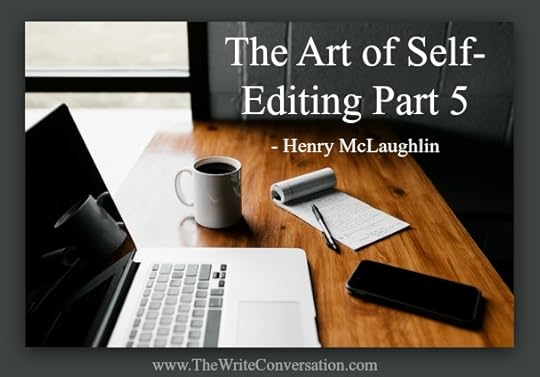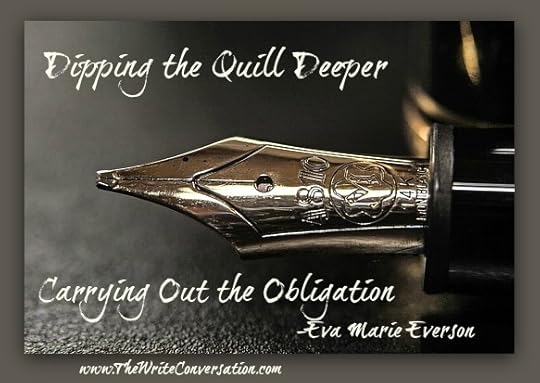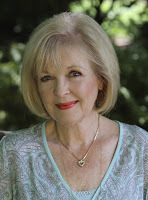Edie Melson's Blog, page 231
July 26, 2019
Sell Your Book Before It's Written by Speaking

by Cathy Fyock @CathyFyock
How can you sell books before the book is written when you’re speaking?
I’m giving a presentation before my book is released. What can I do? Eric Williamson, author of How to Work with Jerks , called Cathy to ask her this question. Here are some ideas.Just because your book isn’t yet published does not mean that you can’t begin marketing your book! In fact, there are many things authors can and should do to get the buzz going well before the official launch. And, if you have the opportunity to speak for a group before the launch, why not maximize the opportunity?
Use the name of your book as the title for your talk. By using the same title for your presentation, you’ll be strengthening the brand awareness of your book title. You’ll also be setting up more interest for your book.
In your bio/introduction, position yourself as the author of the forthcoming book (title), to be released (date).Furthermore, include “Author of the forthcoming book” on your email signature for all your correspondence prior to launch. Many of our clients also proudly wear their “Ask me about my book” button to generate conversation at a conference or program. Lois can attest to the power of the button to keep you on task!
Include “Author of the forthcoming book” on your email signature for all your correspondence prior to launch.#SpeakToSell
During your presentation, made one or more references to the book.DON’T be a tease and withhold information to the group. DO mention that the book provides a deeper exploration into a topic or issue, and share some of the content.
Provide a handout that includes your contact information.A handout may be in traditional format, or it could be a postcard, or better yet, a bookmark. Go ahead and create a mock up cover (go to PowerPoint, and in portrait mode add a graphic, the title, and your name) and include this on the handout. This allows those who hear you speak to be able to connect with you and potentially hire you for other speaking engagements, or to purchase your book.
Have some way for the audience to connect with you.For example, have a special white paper, checklist, or other handout of value that you send to attendees once you have their contact info. Attendees can access this “Irresistible Free Offer (IFO)” by visiting a landing page. Or, use a response card that attendees complete with their contact information, and request any of the IFOs mentioned in the program. You may also use electronic means to gather information, with programs like kiwilive.com. The speaker asks audience members to text “IFO” to a keyword the speaker chooses (for example "Lois info”) and the offer is immediately provided and contact information received.
Pose a question or issue that has people talking to you or about you during the conference that is connected with your book.Invite people to share a story with you, or use a catch-phrase that is repeated or shared during the conference. For example, with Eric’s book about working with jerks, he asked for examples of jerk stories and was able to gather several new stories for future blog posts.
Offer a "deal" to people who respond to a "pre-publication" offer of the book.Maybe attendees can pay now and get an autographed book with free shipping. If you offer pre-publication sales, be transparent with your customers about launch dates and keep them posted on publication details. Many have used this strategy to actually fund creation of their book!
Activity: Just because your book isn’t finished does NOT mean you can’t begin promoting it in your next presentation! Consider one of the ideas provided here to include in your next engagement.
One of our favorite stories of how to promote your book when you don’t have actual books on hand was demonstrated by our friend Peter Margaritis, author of Taking the Numb out of Numbers. He was scheduled to attend Influence, the annual convention of the National Speakers Association, and wanted to let his friends and colleagues know about his new book. The problem was that the book would not be available until after the convention. Not wanting to miss an opportunity, Peter, with the help of his publisher Kate Colbert of Silver Tree Publishing, created large postcards the size of his book, with the book’s cover on one side and other book details on the other. Throughout the conference Peter and his author friends posed holding the book (the postcards) and created buzz on social media. The strategy worked so well that when Kate Colbert’s new book, Think Like a Marketer, was released, she also created postcards and continues to sprinkle these when attending meetings and appointments, making others aware of her excellent new book.
Kate adds, “Perhaps key to that story is that both of us had our books already available for pre-order on Amazon at the time we promoted our books via the postcards, so we were able to “close the deal” on the interest we drummed up with the cards because the cards were more than just a buzz-generator or a ‘coming soon’ announcement. The cards were the coming-out party for the books — a sort of ‘Did you know about my new book? Here’s the scoop and a photo. Here’s how to pre-order your copy today. Thank you.’ “
TWEETABLESSell Your Book Before It's Written by Speaking - @CathyFyock on @EdieMelson (Click to Tweet)
7 Ways to Sell Your Book Before it's Written - @CathyFyock on @EdieMelson (Click to Tweet)
 Cathy Fyock is The Business Book Strategist, and works with professionals and thought leaders who want to write as a business development strategy. She is the author of nine books, including her most recent with coauthor Lois Creamer, The Speaker Author: Sell More Books and Book More Speeches. Since starting her business in 2014 she's helped more than 150 professionals become published authors. You can reach her at Cathy@CathyFyock.com.
Cathy Fyock is The Business Book Strategist, and works with professionals and thought leaders who want to write as a business development strategy. She is the author of nine books, including her most recent with coauthor Lois Creamer, The Speaker Author: Sell More Books and Book More Speeches. Since starting her business in 2014 she's helped more than 150 professionals become published authors. You can reach her at Cathy@CathyFyock.com.
Published on July 26, 2019 22:00
July 25, 2019
5 Characters You Don't Want in Your Writing Story

by Lori Hatcher @LoriHatcher2
Authors go to great lengths to develop engaging, relatable, and winsome characters. Many experts say strong characterization is the key to a successful novel. If we can craft a charming lead, pull together a strong supporting cast, and weave a dynamic plot, we have a chance at a best seller.Our writing journey, however, is often fraught with characters that have no place in our story. They add nothing to the plot, fail to move the action forward, and drain energy and momentum. As we self-edit the writing pages of our lives, here are five characters we’d do well to cut out:
ImpatienceImpatience is a bossy character, full of ambition and steam. While Impatience sometimes gets stuff done, it does so at the expense of others. It shoves people aside, disregards protocol, and blows past learning opportunities with nary a backward glance. Worst of all, impatience steamrolls its own agenda with little regard for God’s timing.
HasteHaste often plays a supporting role to Impatience. It fails to fact check, ignores the squiggly lines in Word, and seldom stops to proofread. Devaluing excellence, it submits work without editing and poo poos the value of letting writing sit for a few days before revising. Haste’s goal is completion, not conscientiousness and often substitutes quantity for quality.
SelfishnessSelfishness is the character everyone loves to hate. Narcissistic to the core, this bad boy concentrates on advancing his website, his book, and his ministry above all others. He monopolizes conversations, agents, and editors at writers conferences and employs questionable or rude methods to better position himself. Eager to accept Likes, reviews, and guest blog posts but unwilling to give, Selfishness capitalizes the I in the middle of his name so everyone will know who’s most important.
Jealousy Jealousy might be the ugliest character we encounter in our writing lives. Despite its bright green eyes, Jealousy is ugly and small. It refuses to rejoice in the successes of others, believing, somehow, they diminish its own. It carries a tape measure everywhere, measuring other writers’ careers, platforms, and writing ability. When Jealousy turns its measuring stick on its own work, it receives no joy, for it maintains a mental list of others whose success is greater.
AgnosticismSurprisingly, Agnosticism makes at least a cameo appearance in every Christian writer’s life. Known for a faith that ebbs and flows with circumstances, publishing trends, and rejection letters, Agnosticism fails to rest securely in God’s promise that no plan of his can be thwarted (Job 42:2). It second guesses God’s call to write and doubts God will use its writing for his purposes. Working in its own strength rather than God’s, Agnosticism seldom prays and often frets.
So here you have it—five characters we should diligently edit out of our writing stories. If you think you’ve seen any of them skulking in the shadows or sneaking through the pages, hit the search feature in God’s Word, select Find, and remove any highlighted results. Better still, use the Find and Replace feature to substitute new characters that will advance the narrative of your writing life and draw you closer to the Lord.
Now it’s your turn. Which characters have you found to be the most detrimental to your writing life? What steps have you taken to remove them?
TWEETABLES5 Characters You Don't Want in Your Writing Story - @LoriHatcher2 on @EdieMelson (Click to Tweet)
5 Characters We Should Diligently Edit Out of #Writing Stories - @LoriHatcher2 on @EdieMelson (Click to Tweet)
 Lori Hatcher is the editor of
Reach Out, Columbia
magazine and the author of several devotional books, including
Hungry for God … Starving for Time, Five-Minute Devotions for Busy Women
, which won the 2016 Christian Small Publisher Book of the Year award. Her most recent book, Refresh Your Faith – Uncommon Devotions from Every Book of the Bible is due out in the spring of 2020 with Discovery House.A blogger, writing instructor, and inspirational speaker, her goal is to help busy women connect with God in the craziness of everyday life. You’ll find her pondering the marvelous and the mundane on her blog,
Hungry for God. . . Starving for Time
. Connect with her on Facebook, Twitter( @LoriHatcher2), or Pinterest (Hungry for God).
Lori Hatcher is the editor of
Reach Out, Columbia
magazine and the author of several devotional books, including
Hungry for God … Starving for Time, Five-Minute Devotions for Busy Women
, which won the 2016 Christian Small Publisher Book of the Year award. Her most recent book, Refresh Your Faith – Uncommon Devotions from Every Book of the Bible is due out in the spring of 2020 with Discovery House.A blogger, writing instructor, and inspirational speaker, her goal is to help busy women connect with God in the craziness of everyday life. You’ll find her pondering the marvelous and the mundane on her blog,
Hungry for God. . . Starving for Time
. Connect with her on Facebook, Twitter( @LoriHatcher2), or Pinterest (Hungry for God).
Published on July 25, 2019 22:00
July 24, 2019
The Art of Self-editing, Part 5

by Henry McLaughlin @RiverBendSagas
The Final Frontier—The Professional EditOver the past few weeks, we’ve done a lot of work revising and rewriting our manuscript. We’re ready to submit to our dream agent, or the agent who requested a full manuscript at the conference we attended last month. Our finger hovers over the send button. It’s like sending our first child to their first day of school. We’re launching into a whole new world.
But wait…there’s more.
One of the reasons we hesitate is we’re just not sure. We want to take one more read through. We do. Nothing jumps out at us, but what we’re still not sure.
This is the time to seek a professional edit.
If we’re going to self-publish, we definitely need to have a professional editor examine our work.
I believe it’s worth it to get a professional edit even if we seeking traditional publishing. It will help us make our manuscript the best it can be.
In either case, we want to invest in preparing our work to be the best we possibly can.
Finding an EditorSo where do we find these editors? How do we find most things these days? Start with a Google search for professional editors. The search will produce a list of editorial organizations. If you want a Christian editor, search for Christian professional editors. Another resource is annual writers’ market guides. Besides agents and publishers, many will list individuals who offer editing services. At writers’ conferences, we may make connections with freelance editors. Don’t forget word of mouth within your writing network.
Develop a list of potential editors and start narrowing it down. You are looking to hire someone to do a job for you. Treat it that way.
Do they edit what you write? Some editors focus on special areas such as academic, legal, or medical. Some are more comfortable with fiction than non-fiction.
Ask about their experience. How long have they been editing? How many books have they worked on? How many have ultimately been published? Remember, the freelance editor is one of many who make contributions to a book being published. If not many have been published; it’s probably not because of the editing job they did.
Can they provide references?
Be ClearBe clear on what kind of editing they do and what kind of editing you’re looking for. A service I provide is a developmental or content edit. You may be looking for a line edit or proofreading. Do your research and be clear.
How do they work? I like to work in 10,000 word blocks of the manuscript. This helps me periodically confer with the author to make sure I’m meeting her needs. I believe in checking in after each section is completed. Other editors may have a different approach. You need to determine if it’s an approach you can work with.
When I’m negotiating with a potential client, I propose an audition edit of the first 1,000 words. This does two things. It shows the author my style and helps them decide if it’s workable for them. The process also helps me determine how much work I think it’s going to take and give them a rate to consider.
Thank you for sharing the past five weeks on self-editing. My prayer is you found these posts helpful and encouraging.
What has your experience been with finding and working with professional editors?
TWEETABLESThe art of self-editing, part 5 from Henry McLaughlin, @RiverBendSagas on @EdieMelson (Click to Tweet)
The final frontier, The professional edit - insight from Henry McLaughlin, @RiverBendSagas on @EdieMelson (Click to Tweet)
Don't Miss the Other Posts in this SeriesThe Art of Self-editing, Part 1The Art of Self-editing, Part 2The Art of Self-editing, Part 3The Art of Self-editing, Part 4
The Art of Self-editing, Part 5
 Henry’s debut novel, Journey to Riverbend, won the 2009 Operation First Novel contest.
Henry’s debut novel, Journey to Riverbend, won the 2009 Operation First Novel contest.Henry edits novels, leads critique groups, and teaches at conferences and workshops. He enjoys mentoring and coaching individual writers.
Connect with Henry on his blog, Twitter and Facebook.
Published on July 24, 2019 22:00
July 23, 2019
Taming the Beast Called Time Management for Writers

by DiAnn Mills @DiAnnMills
Busy writers realize they must master the feat of time management or they will fall into a hole called overwhelmed and unproductive. Editors and those depending on us will be disappointed, possibly ending a working relationship. With a few guidelines, we can learn how to take charge of our responsibilities and breathe while giving us time to spare. (Smile too)The key is to understand life is filled with interruptions—family, health, vacations, and unanticipated delays. We can prepare for these intrusions by planning ahead.
Here are 10 tips to master and prioritize how we spend our time.Record the number of work hours in your day. Be realistic. God should take first place in our lives, and His word shows us our families and friends are vital.Prioritize the tasks to be completed in order of urgency—book projects, articles, blog posts, social media posts, and any other marketing and branding deadlines.Calendar the due dates, preferably an online calendar that will alert the user, when each task is to be emailed or posted.Count back 1 month from the due date determined in items 2 and 3. The earlier the writer can complete the project, the better. This becomes the new due date. *If the writer is working on a book project, back up the date 2 to 3 months.Look at those new due dates. How many written words per day will ensure those tasks are completed by the newly established dates?Record that word count in a prominent place as a daily reminder.Reach out to others who have mastered time management for assistance.A goal and a plan take time. If your plan isn’t working, reevaluate and begin again.Take time for you. All work and no play won’t clear the cobwebs. Writers need to be fresh and excited about their work.Writers who meet their deadlines are the writers who are successful.
What’s your secret for managing the beast of time management?
TWEETABLES
Taming the Beast Called Time Management for Writers - @DiAnnMills on @EdieMelson (Click to Tweet)
10 Tips to Master and Prioritize Your Time as a Writer - @DiAnnMills on @EdieMelson (Click to Tweet)
 DiAnn Mills is a bestselling author who believes her readers should expect an adventure. She creates action-packed, suspense-filled novels to thrill readers. Her titles have appeared on the CBA and ECPA bestseller lists; won two Christy Awards; and been finalists for the RITA, Daphne Du Maurier, Inspirational Readers’ Choice, and Carol award contests.
DiAnn Mills is a bestselling author who believes her readers should expect an adventure. She creates action-packed, suspense-filled novels to thrill readers. Her titles have appeared on the CBA and ECPA bestseller lists; won two Christy Awards; and been finalists for the RITA, Daphne Du Maurier, Inspirational Readers’ Choice, and Carol award contests. She is the director of the Blue Ridge Mountain Christian Writers Conference, Mountainside Marketing Retreat, and Mountainside Novelist Retreat with social media specialist Edie Melson. Connect here: DiAnnMills.com
Published on July 23, 2019 22:00
July 22, 2019
Dipping the Quill Deeper: Carrying Out the Obligation

by Eva Marie Everson @EvaMarieEverson
While I was beseeching our Lord to-day that he would speak through me, since I could find nothing to say and had no idea how to begin to carry out the obligation laid upon me by obedience. ~St. Teresa of Avila
She was a noblewoman who lived in the 16thcentury. She chose the reclusive life of a Carmelite nun over a life of privilege and ease. She was a mystic. An author. A religious reformer. A theologian. A woman after God’s own heart. A rare beauty. And she penned lines such as those above that can take my breath away.I don’t know about you, but there are truly times when I sit at my desk, staring at a blank screen, wondering how in the world I’m going to do that which I believe God has called me to do. Not just write and not just speak but write something or say something that has true value. A lasting effect for the kingdom of God.
So, what do I do?
Sometimes I take a walk. Sometimes I watch a movie … or clean a sink … or read a book … or wash a load of clothes … or listen to a majestic piece of music. Because I am … me.
And, apparently, I am not St. Teresa of Avila. When Teresa of Avila faced the same problem, she prayed. Okay, she did more than that—she beseeched our Lord.
Beseeching is greater than a request or a simple one-liner with our eyes closed and so much more than a dramatic pounding of the fist against the table or your desk. Beseeching is asking fervently. With zeal and passion. With urgency.
Writing for the Lord—that which we have been called to do by obedience—is serious work. Having a day or even days when the words seem stuck or an idea won’t stir isn’t unusual, so if that sounds familiar to you—about you—do not be dismayed.
But don’t do the dishes … or read a book … or wash a load of clothes … or listen to a magnificent piece of music …
… until you beseech the Lord, knees bent, asking—pleading—“Give me your words, Lord. What shall we write today?”
TWEETABLEDipping the Quill Deeper: Carrying Out the Obligation - @EvaMarieEverson on @EdieMelson (Click to Tweet)
 Eva Marie Everson is the multiple award-winning and bestselling author of over 35 books, both fiction and nonfiction. She is the president of Word Weavers International and the director of Florida Christian Writers Conference and North Georgia Christian Writers Conference. Eva Marie and her husband make their home in Central Florida where they enjoy a lake view, their children, and grandchildren. They are owned by a very small dog.
Eva Marie Everson is the multiple award-winning and bestselling author of over 35 books, both fiction and nonfiction. She is the president of Word Weavers International and the director of Florida Christian Writers Conference and North Georgia Christian Writers Conference. Eva Marie and her husband make their home in Central Florida where they enjoy a lake view, their children, and grandchildren. They are owned by a very small dog.
Published on July 22, 2019 22:00
July 21, 2019
5 Tips for Writing Jugglers

by Any Mulligan @AneMulligan
I can’t juggle. Oranges, lemons, it doesn’t matter. They all fall to the floor. I tried grapes, erroneously thinking since they are smaller, I could catch them easier. Wrong. Believe me, I’ve practiced, until the dog started chasing after the grapes. Those are bad for dogs, so I gave up my bid for a career in the circus to focus on something I can juggle.
Writing projects.I discovered working one either one feeds my muse for the other. And all three are works of fiction—one is a script, one a novella project and the third, a full-length novel.
My “normal” is one writing project at a time. That doesn’t include blog articles. I can write blog posts or magazine articles in the midst of fiction. But when I first added a second fiction project to my already full schedule, I wondered if I could keep the characters straight and in their own world.
Besides the writing, there is research, editing, plotting. And I had to keep them separated for each. But I did it! Even when I tossed a third project to the juggling act.
Here are a few tips on how to keep them straight.Keep simultaneous projects different if possible. I’m writing a script for an old-fashioned medicine show. It’s silly, funny, filled with alliteration and giggles. The novella is pure contemporary romance, and the novel is women’s fiction set in 1929-30. That gives me plenty of difference to keep them out of each other’s worlds.Have character photos and a bullet list of personality traits handy. Using an actor’s resume as a pattern, I printed out a character’s photo with their main personality profile items on the back: past wound, the lie they believe, their GMCs and a few other defining facts about them. Assemble your cast before beginning that project. While I write in Scrivener and keep everything there, I have a physical story board for each project. I use small bulletin boards, and switch them for each project. Having their faces before me grounds me in their story.Have some time of activity between projects. Fold laundry, empty the dishwasher, take a walk. Anything to close the door on the previous work before starting a new one. That allows your mind turn off one project and prepare to switch between the stories.Set your hours so you have specific amounts of time to work on each project.
And always give yourself grace to change your schedule when life interrupts. That simple phrase, give yourself grace, I learned from my good friend Edie Melson. It changed my life.
TWEETABLES5 Tips for Writing Jugglers - insight from @AneMulligan on @ediemelson (Click to Tweet)
5 Tips to Help Writers Juggle - @AneMulligan on @EdieMelson (Click to Tweet)
 Ane Mulligan has been a voracious reader ever since her mom instilled within her a love of reading at age three, escaping into worlds otherwise unknown. But when Ane saw Mary Martin in PETER PAN, she was struck with a fever from which she never recovered—stage fever. She submerged herself in drama through high school and college. Years later, her two loves collided, and a bestselling, award-winning novelist emerged. She resides in Sugar Hill, GA, with her artist husband and a rascally Rottweiler. Find Ane on her website, Amazon Author page, Facebook, Twitter, Instagram, Pinterestand The Write Conversation.
Ane Mulligan has been a voracious reader ever since her mom instilled within her a love of reading at age three, escaping into worlds otherwise unknown. But when Ane saw Mary Martin in PETER PAN, she was struck with a fever from which she never recovered—stage fever. She submerged herself in drama through high school and college. Years later, her two loves collided, and a bestselling, award-winning novelist emerged. She resides in Sugar Hill, GA, with her artist husband and a rascally Rottweiler. Find Ane on her website, Amazon Author page, Facebook, Twitter, Instagram, Pinterestand The Write Conversation.
Published on July 21, 2019 22:00
July 20, 2019
Give It Your Best When You Write

by Tammy Karasek @TickledPinkTam
It was the allotted time to sit down and write. You have perched yourself in front of the computer screen or notebook with a pen and written your fingers numb. As you wrote the piece, whether it’s a blog post, article, devo or part of your book, did you given it your best effort?I have to confess, that there have been times in the past that I would wait until the last minute or unfortunately my mood was not conducive for productivity but I would be at a due date. I needed to finish the piece for submission and I hurried through it to catch a deadline. I threw some words down on the paper, rearranged the order to make it somewhat flow and pressed the submit button.
Then I agonized later for the error of my ways.
At the beginning of this year, one of my prayers was over any writing that I would do. I prayed that God would show me when my best wasn’t in a piece I felt entitled to type The End on. I asked Him to give me an unsettling about it.
And man has He! They say, be careful what you ask for, and this applied here. There have been times where I was about to hit the submit button and my computer froze or the piece wouldn’t transfer. I was living in answered prayer.
In order to get a handle on making sure my best work is what I published, I have come up with three checkpoints that I’ve been using this year. Maybe they will give you some help so you, too, can do the same.
Three Checkpoints for Excellence1. Plan your writing schedule better. What I’ve been doing is backing up my deadline for something one week earlier than when it is actually due. I guess I’m playing a little mind game with myself, but it’s working. By building margins in the deadline dates, it allows time for the words to roll around in my mind. Have a piece due on the fourth Tuesday of the month? Put it on the third Tuesday in red bold and then a different color on the true due date. This will allow time to write the post, do what ever extra is needed—photos, references, etc.—and then read it again a day or two later. Does it feel right? Have that peace I gave it my best effort? Perfect, hit that submit button.
2. Make an attitude adjustment. Are you rehashing a snarky comment made directed at you? Family member say something hurtful? Bitter about something you don’t want to admit? This could be blocking your entire thought process, which could cause you to be writing with a sour attitude without even realizing it. Time to get up and walk away. Take a breath. Say a prayer. Maybe even make a needed phone call.
3. File it for later.When you complete a writing piece, sit back and ask God to show you if you really applied yourself to it. If you get the feeling it’s not your best piece, do not hit delete. Make yourself a file that says, “Needs Work.” File the piece there. Pull it out on another day. Let it brew until the words start pouring into again.
“Whatever you do, work heartily, as for the Lord and not for men,” Colossians 3:23 ESV
My prayer for each of us is that we always present or post our best work wherever we have placed our words. Because remember—we want all things to be pleasing to God.
What about you? Do you have a tip to add to those above?
TWEETABLE
Give it Your Best When You Write - @TickledPinkTam on @EdieMelson (Click to Tweet)
 You’ll find Tammy seeing humor and causing laughter in every aspect of life. Her past, filled with bullying and criticism from family, is the driving force of her passion to always encourage others and give them The Reason to smile. She’s been married to her college sweetheart, Larry, for 37 years, a mom to their grown daughter, Kristen, and wrapped around the paw of a little dog named Hattie. Born and raised in Ohio, her family now resides in South Carolina. She is the President of Word Weavers Upstate SC, member of ACFW and My Book Therapy/Novel Academy. She’s the Blog Editor for Word Weavers International. A Conference Assistant for Blue Ridge Christian Writers Conference. A monthly contributor for The Write Conversation. A contributor in the 2018 Divine Moments Compilation Book—Cool-inary Moments. Also a regular contributor to several other blogs.
You’ll find Tammy seeing humor and causing laughter in every aspect of life. Her past, filled with bullying and criticism from family, is the driving force of her passion to always encourage others and give them The Reason to smile. She’s been married to her college sweetheart, Larry, for 37 years, a mom to their grown daughter, Kristen, and wrapped around the paw of a little dog named Hattie. Born and raised in Ohio, her family now resides in South Carolina. She is the President of Word Weavers Upstate SC, member of ACFW and My Book Therapy/Novel Academy. She’s the Blog Editor for Word Weavers International. A Conference Assistant for Blue Ridge Christian Writers Conference. A monthly contributor for The Write Conversation. A contributor in the 2018 Divine Moments Compilation Book—Cool-inary Moments. Also a regular contributor to several other blogs. Connect with Tammy: Blog:http://www.tammykarasek.com Email: tickledpinktammy@gmail.com
Published on July 20, 2019 22:00
July 19, 2019
Letting Go of Negative Thoughts for Better Writing

by Emme Gannon @GannonEmme
How often do we sit at our computer, ready to write, but are blocked by faraway thoughts—mindless wanderings that pull us off subject into an unfamiliar abyss. This often occurs when our world is jolted by change. Life is good. Comfortable. Then God moves us to a new place. Unfamiliar. An unknown world bereft of our knowledge and control. Life tilts away from the familiar and we become emotionally off balance. We can’t concentrate. Our mind becomes mush. We doubt our calling.Research tells us that the average person has between 60,000 to 80,000 random thoughts per day, of which 80% are negative. Negative thoughts are often accusatory—reminders of a bad choice or a situation that we deem hopeless. They could be musings of a dream that failed to occur, despite our best efforts. Or what-if thoughts that project a scenario of darkness that has the potential to render us defenseless. Truth is often hidden by a self-imposed wall, guarded and held in place by fear. For the writer, negative thoughts have the potential to be scene stealers, in a bad way.
These spontaneous reflections are chaotic and can be repetitive. They produce inner congestion that often stands in the way of our ability to connect with the world. It is believed that this is a rather recent phenomenon that began to occur after the advent of our modern technological age and has only increased with our dependence, and often misuse, of social media. As we become glued to our computers and cell phones and our minds explode with information, much of it negative, we can take on mindless wandering.
Our thoughts have three inputs: sensory information from the world, sensory information from the body, and self-generated thoughts from our minds. That means that messages from either of these inputs affect all of our choices, from what we eat to how we spend our day, including what communication our brain sends to our body. Fight or flight. Or peace and calm. Each input competes with one another and the information most pronounced survives. If thoughts drive feelings, and we know they do, then we have the potential to self-destruct. Or overcome.
However, we need not fear. There is help. And hope. None of this takes God by surprise. Before the beginning of time, He knew us and chose when we would arrive on planet earth, and where. We are here for such a time as this. His goal is to make us into the image of His Son. That always requires yielding of self. Letting go of the picture of what you thought life would be and learning to find joy in the story you’re living.
2 Corinthians 10:3-5 tells us, “For though we walk in the flesh, we do not war according to the flesh, for the weapons of our warfare are not of the flesh, but divinely powerful for the destruction of fortresses. We are destroying speculations and every lofty thing raised up against the knowledge of God, and we are taking every thought captive.” We are admonished to allow God to tear down the barriers that exist apart from His truth. And take every thought captive.
This is not always easy. But the Lord never asks His children to do the impossible. We can start by being conscious of what we are thinking. Reject any thoughts that lie about who you are, who others are, or who God is. Thoughts that make us feel hopeless, worried, or afraid are not from God and will steal creativity. Take such negative thinking to God in prayer and let Him replace your thinking with His.
By directing our minds to go deeper—to the place where God speaks, and by yielding our thoughts to God and allowing Him to harness our senses, our minds are free to explode with the creative gifts He has uniquely placed within each of His children. As our minds de-clutter, our stories go deeper, our characters become more believable, and we are bold to dwell in the place where God whispers. His words. His story. Told to us so that we can write from a heart uncluttered by time and space and yielded to the One who creates all things new.
TWEETABLELetting Go of Negative Thoughts for Better Writing - @GannonEmme on @EdieMelson (Click to Tweet)
 Emme Gannon is a wife, mother, and grandmother who loves to write stories that stir the heart. Her award-winning writing has appeared in Focus on the Family magazine, several anthologies, and numerous newsletters. She just completed her first novel.
Emme Gannon is a wife, mother, and grandmother who loves to write stories that stir the heart. Her award-winning writing has appeared in Focus on the Family magazine, several anthologies, and numerous newsletters. She just completed her first novel.
Published on July 19, 2019 22:00
July 18, 2019
Build a Solid Writing Foundation with These 10 Tips

by Edie Melson @EdieMelson
Despite news to the contrary, I believe this is the best time ever to be a writer. Writing for a living isn’t a get rich quick scheme, but it is possible to make a reasonable income. Becoming a professional writer takes hard work. But if we’re willing to learn the industry and the craft of writing, we can find success. Today I’m going to share my tips that will help you find that success.
10 Foundational Tips to Become a Professional Writer
1. We must realize that it’s a journey and not a destination. This industry is constantly changing. There’s new technology to keep up with, new trends, and even new grammar rules. We do get more experienced, but we never arrive at the point where we know everything.2. We need to be ready to make writing a priority. As I said, in the early stages of becoming a professional writer, we do a good bit of writing for free. Because we’re not getting paid, it’s tempting to think what we’re doing isn’t valuable. We let other requests and commitments get in the way.3. We must invest in learning. This means we commit to spending time reading books and blogs. We also need to invest in classes, workshops, and conferences.4. We shouldn’t expect to get paid for everything we write. I don’t recommend working only for free, but in the beginning, it’s the way we prove our ability and gain valuable experience. Think of it as unpaid internships. Here are two posts that help set reasonable guidelines:Why Professional Writers Should Write for Free, Part 1Why Professional Writers Should Write for Free, Part 25. We have to recognize that learning to write is just part of the equation. Just like any other profession, the publishing industry has a specific way of doing things. It’s important to learn how things are done and the standards that are expected from industry professionals.6. We must not neglect networking. Networking is vital in the publishing industry. We get to know editors and agents because they may one day buy and sell our works. We build relationships with other writers because we need the support and encouragement of those who know our struggles and our joys. Beyond that, other writers are a valuable resource for publishing leads.7. We cannot rely on talent to get us where we want to go. Talent CAN be a starting point, but it isn’t the most necessary component of a successful writer. Diligence, determination, humility, and a teachable heart are things that will get you where you want to go.8. We have to have the courage to try new things. To earn a viable income as a professional writer, we’ll have to step outside our comfort zone. We’ll need multiple income streams and be willing to change as the industry changes.9. Learning new technology is mandatory. Technology isn’t an enemy, it’s a tool. And it’s one that we must each learn to use.10. The path to success is different for each of us. Falling into the comparison trap can be fatal. Becoming a professional writer takes time and hard work, but there’s no magic formula.
These are the things that I believe can put you on the road to becoming a professional writer. Many of you out there also have some valuable insights. I’d love you to share your thoughts in the comments section below.
Don’t forget to join the conversation!Blessings, Edie
TWEETABLES
Build a Solid #Writing Foundation with These 10 Tips from @EdieMelson (Click to Tweet)
10 Things that can help you become a better writer - @EdieMelson (Click to Tweet)
 Edie Melson is a woman of faith with ink-stained fingers observing life through the lens of her camera. No matter whether she’s talking to writers, entrepreneurs, or readers, her first advice is always “Find your voice, live your story.” As an author, blogger, and speaker she’s encouraged and challenged audiences across the country and around the world. Her numerous books reflect her passion to help others develop the strength of their God-given gifts and apply them to their lives. Connect with her on her website, through Facebook, Twitter and Instagram.
Edie Melson is a woman of faith with ink-stained fingers observing life through the lens of her camera. No matter whether she’s talking to writers, entrepreneurs, or readers, her first advice is always “Find your voice, live your story.” As an author, blogger, and speaker she’s encouraged and challenged audiences across the country and around the world. Her numerous books reflect her passion to help others develop the strength of their God-given gifts and apply them to their lives. Connect with her on her website, through Facebook, Twitter and Instagram.
Published on July 18, 2019 22:00
July 17, 2019
A Balanced Life for Writers

by Edie Melson @EdieMelson
Trust in the Lord forever, For in God the Lord, we have an everlasting Rock (Isaiah 26:4 NASB).
Everywhere we turn we’re being urged to find balance. In advertising we’re given soothing images of candles, yoga, exercise, places to get away, etc. etc. etc. In my life, I try to balance writing, marketing, family, friends, church . . . all good activities, but too much is still too much. No amount of scented candles or stretching can help a writer who is struggling to find time to write. As I try once again to wrest control from the chaos that is my schedule I’ve come to a startling revelation.
A balanced life doesn’t look like we think it should.
I’m learning that balance isn’t an exterior stability, it’s an interior poise. I don’t care how strict we are about planning, diet, exercise, even environment, times of chaos will erupt. We know this is true by experience, but more importantly we know it by looking at the life Jesus lived.
As we march through the New Testament, we see Jesus when the crowds are pushing in, clamoring for attention. We see His followers disappoint Him. We even see times when He is faced with unexpected—in a human sense—death.
Within this outward chaos, we also see a perfect example of living a life of balance. And it has nothing to do with what’s going on around Him, much less planning, diet, exercise, or environment. It has everything to do with His absolute passion for allowing God to direct His steps.
So how do we imitate Jesus? We draw closer to God. It’s that simple and that difficult. In the past, as deadlines crowded in, my inclination was to spend more time writing and less time with God. It’s embarrassing to share that about me, but it’s true. Now, the busier I am, the more deliberate I am about my time in the Word and in prayer. I’ve learned—the hard way—the only way to come through the chaos is at the side of Jesus.
So as I launch full-force into busyness and deadlines, I’m remembering the lessons I’ve learn. I’m looking to God for balance, not at what’s happening around me. Care to join me?
TWEETABLE
Thoughts on a balanced life for writers - @EdieMelson (Click to Tweet)
 Edie Melson is a woman of faith with ink-stained fingers observing life through the lens of her camera. No matter whether she’s talking to writers, entrepreneurs, or readers, her first advice is always “Find your voice, live your story.” As an author, blogger, and speaker she’s encouraged and challenged audiences across the country and around the world. Her numerous books reflect her passion to help others develop the strength of their God-given gifts and apply them to their lives. Connect with her on her website, through Facebook, Twitterand Instagram.
Edie Melson is a woman of faith with ink-stained fingers observing life through the lens of her camera. No matter whether she’s talking to writers, entrepreneurs, or readers, her first advice is always “Find your voice, live your story.” As an author, blogger, and speaker she’s encouraged and challenged audiences across the country and around the world. Her numerous books reflect her passion to help others develop the strength of their God-given gifts and apply them to their lives. Connect with her on her website, through Facebook, Twitterand Instagram.
Published on July 17, 2019 22:00



